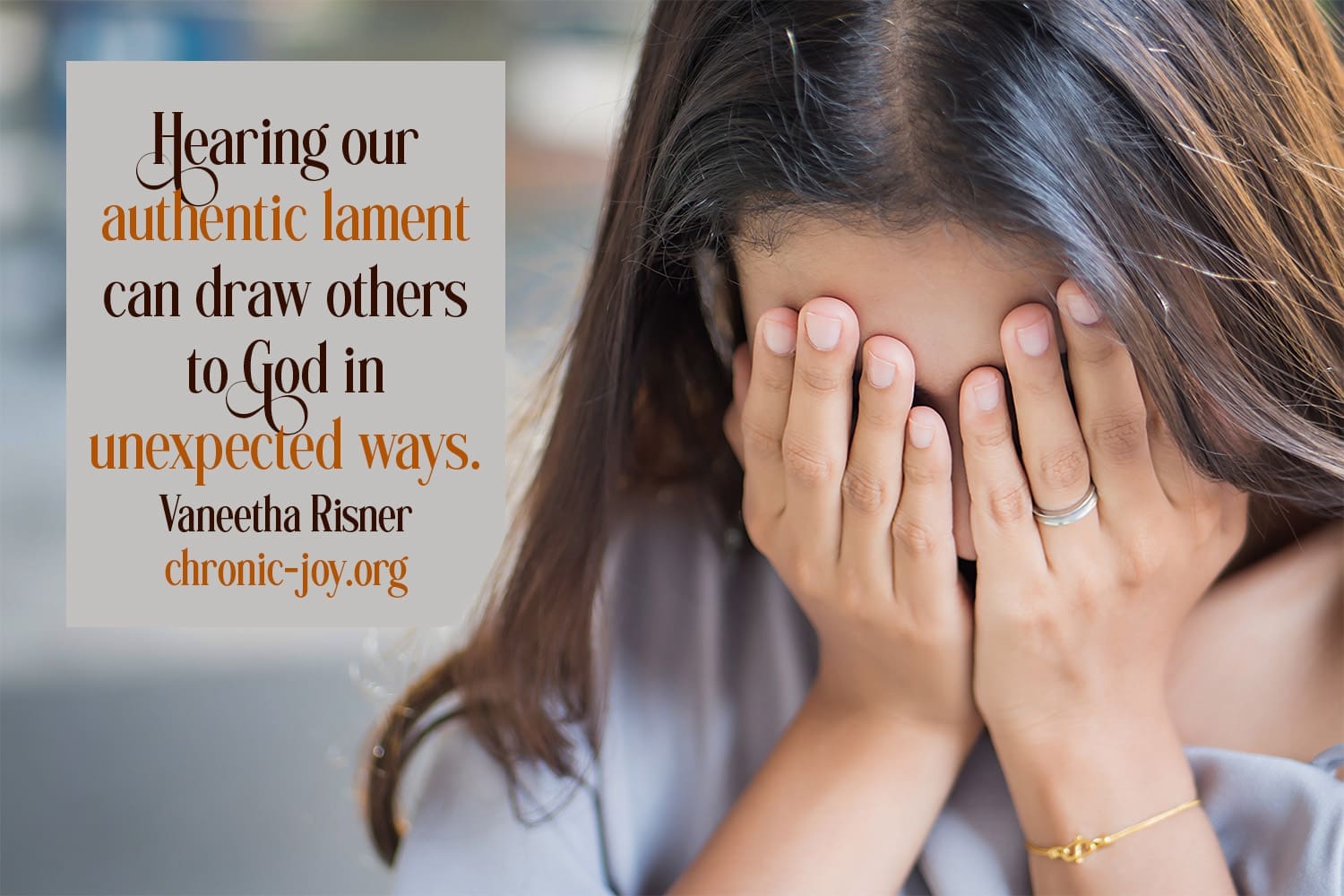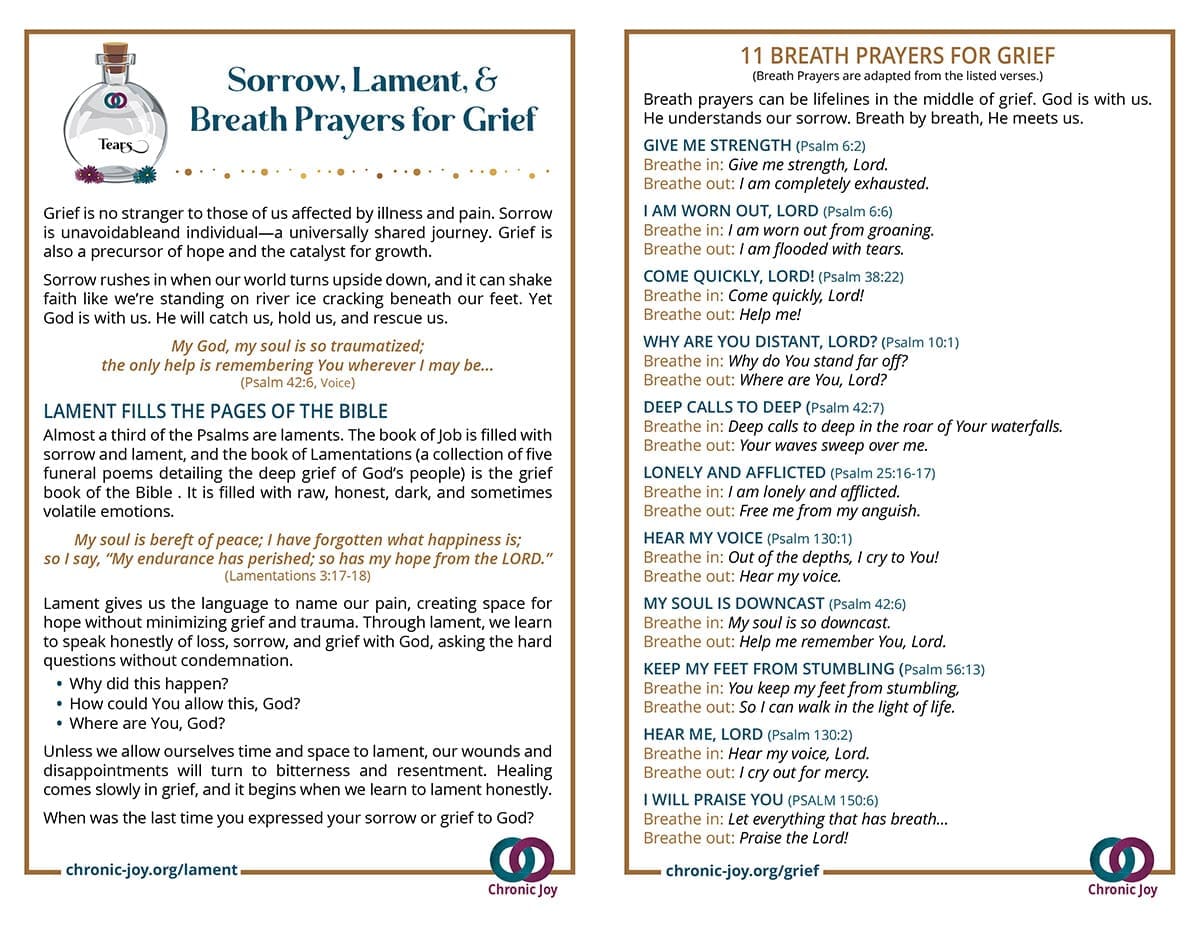
“Hearing our authentic lament can draw others to God in unexpected ways.” Vaneetha Risner
THE BEAUTY OF LAMENT IN SUFFERING
When pain almost strangles us, and darkness is our closest friend, what should we do?
For years, I thought the best response was cheerful acceptance. Since God uses everything for our good and His glory, I felt the most God-honoring attitude was to appear joyful all the time – even when I was confused and angry, even when my heart was breaking, and especially when I was around people who didn’t know Christ.
I have since learned the beauty of lamenting in my suffering. Lament highlights the Gospel more than stoicism ever could. Hearing our authentic lament can draw others to God in unexpected ways. I first noticed the power of lament in the book of Ruth.
I had long seen Ruth as the undisputed hero of the book that bears her name and Naomi as the grumbling character with weak faith and a negative attitude. Now, having walked in similar shoes for a fraction of her journey, I have gained a new respect for the depth of Naomi’s trust in God.
Ruth was an eyewitness to Naomi’s faith. She saw that faith hold fast, even in horrific circumstances – and behind Naomi’s faith, Ruth saw the God who heard Naomi’s lament and didn’t condemn her for it, even as Naomi spoke frankly about her disappointment with God.
Lamenting to a god would have been foreign to Ruth. Ruth’s first god, the god of Moab, was Chemosh. No one would have dared lament or complain to him. Pagan gods were appeased; there was no personal relationship with any of them, especially not with Chemosh, who demanded child sacrifices.
LAMENT SHOWS TRUST IN GOD
Ruth sees a completely different God as she watches Naomi. Naomi trusts God enough to tell Him how she feels.
Naomi’s trust is extraordinary, given the tragedies she has endured. She and her husband had left Israel for Moab with their two sons in search of food. While they were there, her sons and husband died and she was left alone: a widow, a grieving mother, a foreigner – with no means to support herself.
Though she says that His hand has gone out against her, Naomi doesn’t walk away from God in anger. She stays close to Him and continues to use God’s covenant name (Yahweh), asking Him to bless her daughters-in-law. Naomi doesn’t stop praying; she believes God hears her prayers.
Naomi’s trust is further evidenced by her determination to travel to Bethlehem alone. If Naomi felt that God had truly abandoned her, she would never have begun that journey. She would have stayed in bed, pulled the covers over her head, and died in Moab, bitter and angry at God – but she doesn’t do that. She acts in faith, trusting that God will provide for her.
HONESTY IN LAMENT
When Naomi goes back to her hometown, she doesn’t pretend that everything is fine – she is achingly honest. She invites others to peer into the dark corners of her bitterness and frustration. Asserting that God has dealt bitterly with her and has brought calamity upon her, she admits that she is empty.
Her raw words may have made the townspeople uncomfortable (Laments often do.), but her humility and utter honesty would also have drawn people to her. They could grieve with her – and they could grieve their losses too, without fearing God’s disapproval or others’ judgment.
Underlying Naomi’s lament is a deep trust and understanding of God. She speaks truthfully about Him, acknowledging that He is in control of all things and everything is ultimately from Him. She is not resentful of God and has not turned away from Him. Quite the opposite, Naomi is moving toward God with honesty.
LAMENT AMID PAIN
It is in the midst of Naomi’s pain and lament that Ruth comes to know God. Ruth gives up everything to follow Naomi and her God, whom she has come to know personally as Yahweh. She sees His faithfulness through Naomi, discerning that this is a God worthy of worship.
Lamenting keeps us engaged with God. When we lament, we invite God into our pain so that we can know His comfort and others can see that our faith is real. Our faith is not a façade we erect to convince ourselves and others that pain doesn’t hurt – rather, it is an oak tree that can withstand the storms of doubt and pain in our lives, growing stronger through them.
GODLY LAMENT
Blessed are those who mourn, for they will be comforted. (Matthew 5:4)
When we live authentically, we naturally draw others to God’s grace. Naomi’s pain and bitterness could have pushed Ruth away from God as Ruth saw Naomi struggle with God’s goodness. Instead, Ruth saw that Naomi’s hope, even through catastrophic loss, was in a sovereign God who was loving enough to hear and respond to her lament.
We can see that God did hear Naomi’s lament and respond to it. He gave her Ruth, and He gave her Boaz. He gave her a grandson, Obed, who was in the line of Christ – and He gave her Himself, for that is what her heart needed most.
Lament: Beauty Out of Bitterness was first published in April 2016. Adapted and published with permission.


Vaneetha Risner
Author
Vaneetha writes and speaks about meeting God in suffering. She is the author of The Scars That Have Shaped Me, Walking Through Fire, and Desperate for Hope (a Bible study). You can find her writing at Desiring God and Vaneetha.com. Vaneetha lives in North Carolina with her husband, Joel. She has two daughters, Katie and Kristi.

Sorrow, Lament & Grief
Grief is no stranger to those affected by chronic illness, mental illness, chronic pain, and disability. It is both a universally-shared human experience and uniquely individual.

Recent Comments